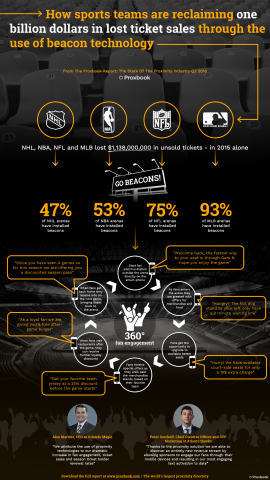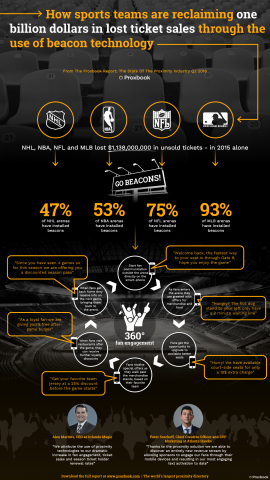NEW YORK--(BUSINESS WIRE)--Proxbook, the world’s largest directory of proximity companies, has released its The Q2 2016 Proxbook Report, which has aggregated information from more than 330 Proximity Solution Providers and reveals latest trends, facts and figures from the global proximity industry as well as the impact of proximity marketing on global professional sports teams and events.
Key insights from the Report include:
Proximity sensors deployed globally continue to grow fast
The
amount of proximity sensors sees a large uptake in Q2 with an increase
of 2,072,500 proximity sensors.
There are now 8,273,500 proximity
sensors deployed globally registered by Proxbook members as of Q2 2016.
6,061,500
of these sensors are beacons. 2,099,000 are NFC sensors and 113,000 WiFi
points. Since Q1 2016, there has been an impressive 33% increase in
global sensors
The 6,061,500 beacons deployed by members of
Proxbook, are aligned with ABI Research’s forecast of 8 million beacons
by the end of 2016 and 400 million beacons deployed by 2020.
Google
invests heavily into proximity
Google bets big on proximity and
wants the ecosystem to succeed. Eddystone adoption continues to grow as
half of the proximity industry supports the newest beacon format from
Google up from 45% since Q1, 2016; Apple is yet to answer
Sports
teams and Venues increases revenue with proximity tech
Sports teams
that have deployed beacons and proximity technologies are seeing a
return on investment (ROI) as big as 40x from incremental merchant
revenues alone within the first year
NBA teams such as the Orlando
Magic, Cleveland Cavaliers, Golden State Warriors, and the Milwaukee
Bucks have opened up an entirely new revenue streams for their teams by
monetizing proximity solutions through sponsored content
Proximity
technologies see widespread adoption in the North American sports market
as 47% of NFL stadiums, 93% of MLB stadiums, 53% of NBA stadiums, and
47% of NHL stadiums have already started to leverage the technology
Sports
and Conference venue owners increase app adoption by as much as 6x after
using proximity technologies
How sports teams and venues are reclaiming over 1 billion dollars in
lost ticket sales
Unsold tickets for professional sports games
accounted for $184 million in lost revenue for the NBA, NHL and NFL
combined in 2015. For MLB, it’s even worse, as $955 million was lost in
2015 from unsold tickets alone.
“Proximity technologies and beacons in particular are not only helping to sell more tickets, they are redefining how sports teams communicate with fans, increasing revenue from merchant sales as well as seat upgrades,” said Thomas Walle, co-founder & CEO of Unacast. “Proximity technology also opens up brand new revenue streams by enabling sponsors to interact with fans and monetize hyper-accurate visitor segments through advertising. We also expect that a number of NBA teams will be leveraging retargeting as an additional solution in the 2016-2017 season.”
The Orlando Magic saw over $1 million in increased ticket sales, 30% app adoption compared to industry standard of 5%, and a 233% increase in Fast Break Pass sales from last season. More than 80% of season ticket holders have accessed and used the app.
“We attribute the use of proximity technologies to our dramatic increase in fan engagement, ticket sales and season ticket holder renewal rates,” said Alex Martins, CEO at Orlando Magic. “The biggest complaints in our business centered around the long lines at the concessions and the fact that you had to miss a good portion of games because you were in that line. Now, we were able to eliminate that problem and look forward to utilizing the enormous amount of data to provide the best possible fan experience in our venue for our customers.”
ABOUT UNACAST
Unacast is the world’s largest network of beacon and proximity data. With 1.8 million beacons and 56 partners, Unacast is the world's largest network of beacon and proximity companies, connecting the physical world to the digital world.
Through the Unacast PROX network, Unacast enables a scalable solution for retailers and brands to use beacon and proximity data for online retargeting, attribution and monetization. Online marketing is mostly based on whatever online trails the consumer leaves behind and how well are you able to leverage that information. However, online presence accounts only for 30% of the entire customer journey. At the same time, the world is being rapidly “sensored up” with beacons and other proximity technologies collecting data about customer’s offline behavior, which accounts for the remaining 70%. The data is however extremely fragmented and siloed between more than 500 companies.
Unacast is the backend of proximity that aggregates and provides a unified platform for the proximity and advertising industry, solving the fragmentation problem to the benefit of both the supply and demand side.
We are the first company to enable a scalable way for retailers and brands to retarget customers online based on behavior in the physical space.
Visit us at www.unacast.com to learn more, and to sign up to PROX.




